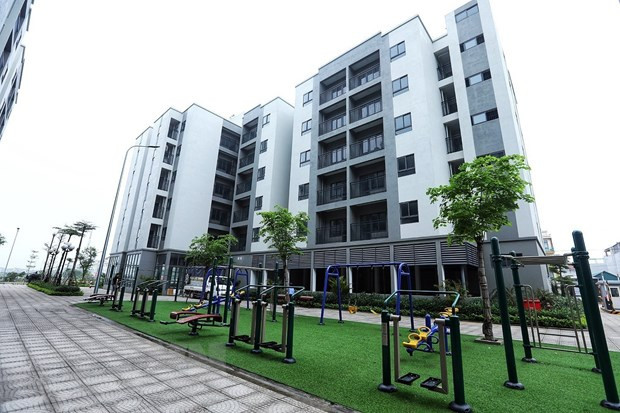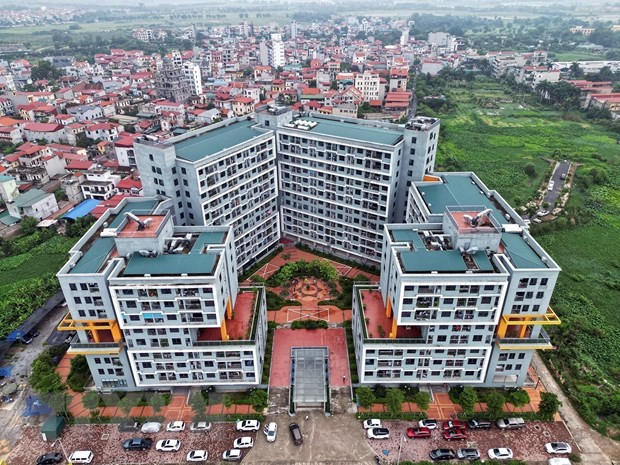If low-cost apartments and social housing are developed quickly and in large numbers, low-income people will not have to consider buying "mini apartments" to live in as a temporary solution.

Nearly 300 social housing projects are currently underway nationwide and the supply will continue to increase in the coming time. Recently, after the "mini apartment" fire in Hanoi, the issue of building affordable housing for low- and middle-income earners has once again been raised.
Low price is the basic factor for "mini apartments" to attract customers, although many people also realize that fire safety is neglected. If cheap apartments and social housing are developed quickly and in large numbers, low-income people will not have to consider buying "mini apartments" to live in as a temporary solution.
Moreover, in reality, it is not easy for many people to qualify for social housing, especially the procedures. Although social housing is aimed at low-income people in urban areas and workers in concentrated industrial zones... but meeting the regulations to qualify for social housing is still difficult for many people.
Therefore, experts believe that it is necessary to “loosen” regulations to expand the number of people eligible to buy social housing. Loosening regulations on the implementation and sale of social housing will avoid the situation where businesses produce products but cannot sell them, while people in need wait in vain to buy a house.
Especially now, some conditions for purchasing social housing in the 2014 Housing Law and related documents are no longer suitable for practice and need to be changed.
Currently, there are 3 criteria to determine the subjects eligible to buy social housing: residence, income and housing area. However, according to Mr. Le Hoang Chau - Chairman of Ho Chi Minh City Real Estate Association (HoREA), it is time to adjust and reclassify the subjects buying social housing. At the same time, it is necessary to loosen some conditions on residence and income so that those in need can access and buy social housing more easily.
Regarding this issue, Deputy Minister of Construction Nguyen Van Sinh said that the draft Law on Housing (amended) drafted by the Ministry of Construction, submitted by the Government, has been considered by the National Assembly at the 5th session, and is expected to be approved at the 6th session. The draft Law on Housing (amended) has 8 policy groups; including an important policy group on social housing development. These are also new points in the Law on Housing (amended).
In particular, regarding the beneficiaries of social housing policies, the draft amended Law aims to reduce procedures in determining the beneficiaries of this type of housing. In the previous draft, there were 3 criteria including residence, income and housing, but this draft removes the criteria on residence. Thus, Vietnamese citizens only need to meet the income and housing requirements to benefit from social housing policies.

At the same time, income conditions are also considered in an expanded direction, raised to consider at higher income levels. Housing conditions, previously if there was a house but less than 10 m2, then it was considered a subject, but now it can be considered up to 15 m2/person, similar to some countries in the region - Deputy Minister Nguyen Van Sinh shared.
The Government has directed the amendment of the Housing Law to ensure consistency with other relevant laws such as laws on land, investment, construction, and real estate business. Along with the reform of administrative procedures, it will be to unblock and promote resources and have policies to encourage businesses to actively participate in investing in social housing projects.
As for the group of policies on social housing, the Government has submitted and the National Assembly has agreed that it will take effect immediately after the draft Law is passed by the National Assembly.
Allocating land for social housing will also overcome previous shortcomings, specifically the requirement to only reserve 20% of commercial housing projects in urban areas of type III or higher. However, the draft Law is adjusted in the direction of assigning provincial People's Committees to proactively allocate enough land to develop social housing according to the approved plan.
Thus, the provincial People's Committee can decide to reserve 20% of land fund for commercial housing projects or arrange independent projects, with enough land fund for social housing development in the coming time.
Notably, the group of preferential policies for investors participating in social housing projects has also been clarified to attract more investors to participate in the development of this type of housing. Accordingly, investors are exempted from land use fees, enjoy 10% profit, and are allowed to reserve 20% of the commercial service land area to invest in utilities as well as commercial services to serve residents in the project area.
In addition, they can also borrow preferential capital with preferential interest rates through commercial banks or the Social Policy Bank to invest in developing social housing projects... At the same time, we will focus on reforming administrative procedures, especially investment policies, land allocation procedures, selecting investors, determining selling prices, and rental prices for social housing.
“With the amendments in the draft Housing Law, in the coming time, a more open mechanism will be created, promoting the development of social housing for low-income people in urban areas, civil servants, and workers in industrial parks...” - Deputy Minister of Construction Nguyen Van Sinh affirmed.
According to Vietnam+